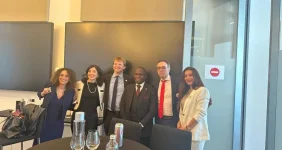Thabo Chakaka-Nyirenda, Malawi's Attorney General, argues that legal processes like arbitration must change to help Africa develop sustainable energy. Speaking at a conference in Paris, he explained how Africa has enormous potential for renewable energy but currently generates very little of the world's green power.
Chakaka-Nyirenda highlighted that only 2% of new renewable energy capacity was from Africa in 2019. He stressed the importance of creating legal frameworks that support clean energy development without forgetting fairness. Malawi is pushing forward with investments in solar, hydropower, and biogas technologies to build a cleaner energy future.
The attorney general pointed out that transitioning to clean energy requires massive funding. African countries must carefully manage their debt and negotiate deals that protect their long-term development goals. He emphasized the need for transparent systems that allow Africa to benefit fully from carbon credits and clean energy production.
As technology advances with artificial intelligence and blockchain, new legal challenges emerge. Chakaka-Nyirenda warned about potential risks like data ownership and cybersecurity problems. He believes arbitration must adapt to address these modern challenges and support national development aspirations.
Malawi is working to strengthen its legal systems to make energy projects more sustainable and financially viable. The country wants to create frameworks that protect national interests while encouraging green energy development. Chakaka-Nyirenda calls for a collaborative approach that prioritizes protective laws, unifying politics, and empowering national sovereignty.
The speech highlighted the critical need for legal systems to evolve. Arbitration should not remain stuck in old methods but must become a dynamic tool for supporting justice and sustainable development. African nations want to be active participants in the global clean energy transformation, not just resource providers.
Chakaka-Nyirenda's message is clear. Legal systems must become more flexible and forward-thinking. They should support countries as they navigate the complex path toward sustainable energy development. This means creating fair, transparent frameworks that protect national interests and encourage green technology investments.
The attorney general envisions a future where legal processes actively support national growth and environmental sustainability. By adopting arbitration and legal frameworks, African countries can unlock their massive renewable energy potential. The goal is to create a more equitable and sustainable global energy landscape.
Chakaka-Nyirenda highlighted that only 2% of new renewable energy capacity was from Africa in 2019. He stressed the importance of creating legal frameworks that support clean energy development without forgetting fairness. Malawi is pushing forward with investments in solar, hydropower, and biogas technologies to build a cleaner energy future.
The attorney general pointed out that transitioning to clean energy requires massive funding. African countries must carefully manage their debt and negotiate deals that protect their long-term development goals. He emphasized the need for transparent systems that allow Africa to benefit fully from carbon credits and clean energy production.
As technology advances with artificial intelligence and blockchain, new legal challenges emerge. Chakaka-Nyirenda warned about potential risks like data ownership and cybersecurity problems. He believes arbitration must adapt to address these modern challenges and support national development aspirations.
Malawi is working to strengthen its legal systems to make energy projects more sustainable and financially viable. The country wants to create frameworks that protect national interests while encouraging green energy development. Chakaka-Nyirenda calls for a collaborative approach that prioritizes protective laws, unifying politics, and empowering national sovereignty.
The speech highlighted the critical need for legal systems to evolve. Arbitration should not remain stuck in old methods but must become a dynamic tool for supporting justice and sustainable development. African nations want to be active participants in the global clean energy transformation, not just resource providers.
Chakaka-Nyirenda's message is clear. Legal systems must become more flexible and forward-thinking. They should support countries as they navigate the complex path toward sustainable energy development. This means creating fair, transparent frameworks that protect national interests and encourage green technology investments.
The attorney general envisions a future where legal processes actively support national growth and environmental sustainability. By adopting arbitration and legal frameworks, African countries can unlock their massive renewable energy potential. The goal is to create a more equitable and sustainable global energy landscape.












